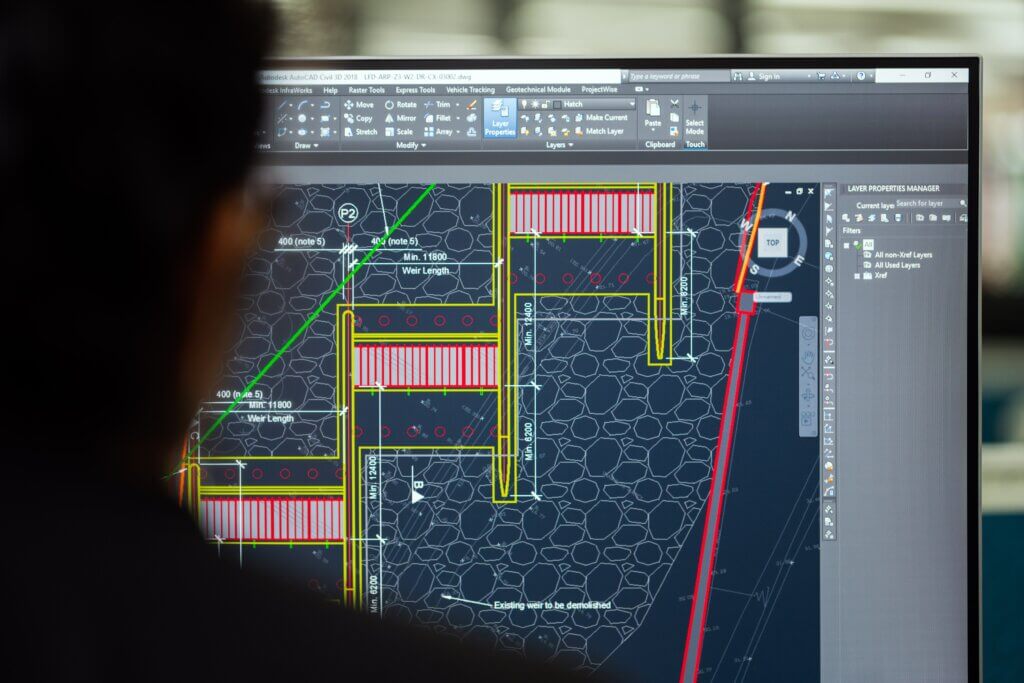What could I do with a civil engineering degree?
A civil engineer degree opens a lot of doors. Of course, it’s a great opportunity to become a civil engineer; however, it will also provide you with the transferable skills for a role in the business, management and financial sectors.
Civil engineers plan, design and manage large construction projects such as bridges, buildings, transport links and other major structures. As a civil engineer, you will use computer modelling software and data from qualitative surveys, tests and maps to create blueprints for each project. The detailed plans will be used to advise contractors on the correct approach for the project that will contribute to minimising environmental impact and risk.
Career options
Natural career paths following a civil engineering degree:
- Structural Engineer
- Transportation Engineer
- Geotechnical Engineer
- Water Resources Engineer
- Construction Manager
- Urban Planning Engineer
- Environmental Engineer
- Project Manager
- Building Inspector
- Consulting Engineer
Career paths where you will have transferable skills:
- Project Management
- Construction Management
- Engineering Consulting
- Infrastructure Development
- Facilities Management
- Environmental Consulting
- Risk Management
- Real Estate Development
- Government and Public Sector
- Non-profit Organisations
- Many employers will accept applications from students that have studied for various degrees.
Work experience
Accumulating work experience will distinguish you from others and it’ll boost your CV. It will also give you an insight into the working practices of an engineering firm. Some university courses will have one year’s working placement included in the course however if your course does not include this, you may want to consider doing a summer internship or placement. You can find these online or by reaching out to construction companies directly. Not only will this provide you with first-hand industry experience, but it will also allow you to expand your knowledge beyond your degree and build a network of industry contracts which may prove useful following your degree.
Typical employers
The most common paths for civil engineers are within the construction sector, working on buildings and large structures, transport and communications infrastructure.
There are also opportunities to work for employers in the production, storage and distribution of electricity, gas and water. Employment can be found with contractors or consulting firms across the UK and overseas. Others may choose to go in-house and work for a national or multinational organisation. Most of these will be within the public sector, including the likes of local authorities, government departments and environmental organisations.
How to enhance your CV
The skills you will develop during your degree and work experience, such as technical skills, will be valued highly by employers in a number of sectors.
These skills will help you to learn the intricacies of creating and building different structures efficiently, ensuring you are using the most appropriate techniques and resources. Working on group projects will allow you to apply your knowledge and understanding learnt through your degree and work experience and help you to understand what it means to work efficiently with others.
Through your degree, you would have developed transferable skills, including:
- Creative approach to problem-solving
- Critical thinking skills
- Ability to interpret data
- Numeracy, IT and communication skills
- Analytical and decision-making abilities
- An awareness of ethical issues.
Further study
Most graduates will continue to study once they find employment with a civil engineering company as there are a number of qualifications that need to be attained to further their career, such as the chartered or incorporated engineer status.
Some also choose to do a postgraduate degree to hone their knowledge and become more specialised. Specialised sectors include water management, earthquake engineering, environmental engineering etc.
What are accounting and finance graduates doing?
The most popular career path amongst civil engineering students following graduation is working as an engineering professional (54%). However, other popular routes include architects, technologists, surveyors and many more. With the skills, insight and knowledge you will have developed during your course, there are a number of opportunities you can consider.
Related Courses
The BEng Civil Engineering course covers broad-based civil engineering subjects to equip you with knowledge and skills to plan, design and implement major civil engineering projects.
There is a 36-week period of paid industrial training incorporated into this degree, which is obtained competitively. If you are successful in completing this period of employment, you will graduate with a ‘Sandwich’ degree which demonstrates to employers that you are ready to make an immediate contribution to their teams.
Every major business requires supply chain and logistics management to ensure processes run efficiently and companies retain their competitive edge. This is a fast-paced, challenging sector perfect for individuals with a logical mind and plenty of ideas.


